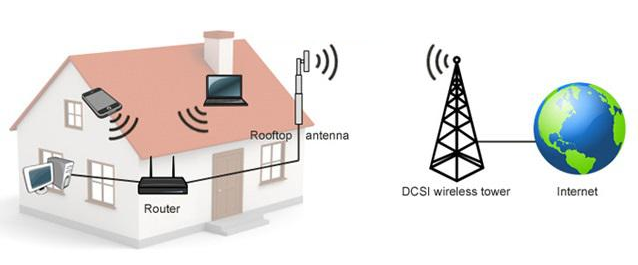The type of internet connection you for will define the kind of internet connection you receive and its user experience. This guide will explore the difference between fixed wireless and fiber internet connection, but before that happens, it is important to understand what each term refers to.
Fixed Wireless Internet
It is usually referred to as a rural internet option that can connect one specific location such as a farm or a house to the internet with the help of radio waves. This means that you need an antenna, not the phone or cable lines for an internet connection. These antennas are attached to your house or nearby and they beam wireless internet signals from your device to a fixed location that is usually a fixed wireless hub/tower.
You don’t necessarily need a large dish to get fixed wireless signals, just an antenna will do the job. However, you still need to make sure that the antenna is in a clear line of sight to the tower. If there are any hills, trees or any large building around it can cause interference to your wireless signal.
The towers that receive fixed wireless signals from your home are land-based. Since they are much closer to the surface of the ground, you will experience fewer interruptions than you would with a satellite internet connection. You will also experience less lag or latency.
Fiber Internet
Fiber internet is a broadband connection that has the fastest internet speeds reaching up to 940 Mbps. This technology uses fiber-optic cable which can send data at about 70% the speed of light. Fiber-optic cables mostly do not get affected by severe weather conditions and can resist electrical interferences as well, which can minimize outages.
The materials used called optical fibers are tiny in nature but slightly larger than human hair. Many of such optical fibers are bundled together to form cable lines, through which pulses of laser or LED light can be carried, to transmit information.
These unique characters and high-speed internet connection make it an excellent choice for gamers, businesses, telecommuters, and multi-users in a household. So much so that it is gradually becoming available in the US. Even Comcast Xfinity has been rolling out fiber internet connections for some years now, and you can see in their Xfinity Internet Plans that they have introduced packages with fiber internet connections as well.
Comparison
Now that we have narrowed down the definition of the two terms, let’s explore the differences between the two and what makes them stand out from each other.
- Installation Time. Fixed wireless connection can be installed and made readily available in just a matter of days, whereas fiber connection takes months. The designs proposed by Federal Communications Commission (FCC) to plan, permit, dig and then install fiber infrastructure shows that all these activities require a lot of time.
- Internet Speed. The internet speeds of fixed wireless connections are available starting from 10 Mbps up to 1000 Mbps. Businesses often utilize fixed wireless connections when they require speeds ranging from 10 Mbs to 500 Mbps. However, fiber internet connection offers speeds of up to 1Gbps or more (1 Gbps = 1000 Mbps) and this is the best option for large organizations, online multiplayer gamers, or households with multiple devices.
- Latency. Ideally, the fiber internet connection should have a lower latency rate, with being transferred over optical fiber cables offering faster internet speeds. But that is not mostly the case. But with longer distances, their twists, and turns, or peripheral equipment (such as switches), the latency of fiber internet turns out exponentially higher. However, latency for a fixed wireless connection is deemed consistent, which at least promises reliability.
- Cost. the cost needed to deploy fiber is quite high, as is already discussed in the installation section. On the other hand, wireless links only need a fraction of deployment costs, going as low as 1/10th of the cost, making it the cheaper option.
- Better Choice. Despite having some disadvantages, fiber internet will continue to prove its significance in the internet market. Wireless connection is the ideal solution in specific regions, like remote areas, though it still outshines fiber in latency, reliability, costs, etc.
Fiber and fixed wireless connection do pose to have major differences in their characteristics, usability, and features that they offer. However, it can be concluded that a fixed wireless connection is the most viable choice for most operators. Fixed wireless connection promises consistency in performance, dependability, lower latency, and lower cost to be deployed and maintained.
